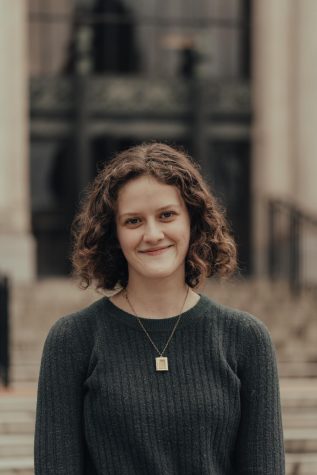OSU leading in Cultivating Change as first chapter on West Coast
April 26, 2021
Oregon State University was once Oregon Agricultural College–so Cultivating Change organizers say it’s fitting it would lead as the first chapter of an agriculture-based LGBTQ+ organization on the West Coast.
Cultivating Change is a national organization which seeks to build community among LGBTQ+ agriculturalists. OSU announced in late March that it has started the fifth chapter of the club in the nation, and the first chapter west of the Mississippi River.
Christina Walsh, the student engagement coordinator for the College of Agriculture and a co-advisor of Cultivating Change, first heard of the organization at a reception in Portland, Ore. a few years ago. Since then, they have stayed in touch with the national organization and eventually found a way to integrate it into OSU.
“[Cultivating Change] really formed as a way for LGBTQ agriculturalists to network, to form community, to advocate for the LGBTQ community within agriculture, and that just sounded like a really cool thing to be a part of as a queer individual working in the College of Ag,” Walsh explained.
Walsh knew there was a need for the club, because they consistently had LGBTQ+ students coming to them for support and mentorship, as someone who is a “very visibly and outwardly queer person.” They realized these students did not have a community with one another.
“Through some conversations with some of these students, it became clear that it’d be a really good idea to form a community within our college where students could really connect [and] understand that they’re not the only LGBTQ agriculture student out there,” Walsh said.
Robin Frojen is the OSU creamery and cheese plant manager and a co-advisor for Cultivating Change.
“Cultivating Change is really an opportunity for our students who are in the LGBTQ+ community to become integrated into the ag community, which sometimes doesn’t feel easy,” Frojen said.
It’s often not easy for LGBTQ+ students in agriculture, according to Walsh, because the relationship between the two communities can be “complicated.” However, they think there are negative stereotypes and perceptions of agriculture in rural communities that don’t always prove to be true.
“I don’t think that [homophobia is] an issue that’s necessarily predominant in rural communities. However, there is a perception out there that agriculture kind of holds fast to some more traditional views,” Walsh said.
In Walsh’s experience, however, they have never personally experienced homophobia in agricultural spaces in Oregon. Frojen also said they have not had negative experiences related to their identity in any of their agriculture connections. However, these perceptions persist.
“Part of the purpose of this group is to try to build those relationships and push through some of the stereotypes that might exist,” Walsh said.
Zane Yinger, a second-year botany major and the treasurer for Students for Cultivating Change, also said agriculture typically occurs in rural areas, and that rural areas often have less exposure to queer people, and less resources for the LGBTQ+ community.
“Folks in rural areas have less exposure, so they’re going to be more fearful of what they don’t understand,” Yinger said.
As well as breaking down stereotypes, Cultivating Change, according to Yinger, also seeks to provide a platform of support for LGBTQ+ people in agriculture when they do feel unwelcome in the field.
Walsh said interest in forming a Cultivating Change chapter was obvious since they first offered the idea. Many students came forward with excitement about starting the club, and College of Agriculture Sciences leadership were really supportive in helping make it happen.
“That said to me that there was a need to form community, to connect with others, to understand each other’s experiences, to find confidence in that community, to not feel isolated,” Walsh said. “…The students find value in this community and have really gained a lot from feeling like they’re a part of something bigger that also understands who they really are and their own lived experience as LGBTQ students.”
This has been true for Yinger, who said they feel more supported and confident in their identity and field as a member of the club.
“Representation is just really awesome and being able to see yourself reflected around you and see that your goals and hopes and dreams are doable…it just feels really good to see yourself in others and especially in a career where you maybe feel that you are potentially less welcome,” Yinger said.
According to Yinger, Cultivating Change is thus far having fun and finding success in establishing the club, and advisors and members of the club are excited about it continuing to grow.
“I’m really excited to see where it goes in the future, because I think once we’re back on-campus it’s going to get even bigger,” Walsh said.
There’s also potential for more chapters to emerge on the West Coast.
“I wouldn’t be surprised if other ag colleges at land-grant universities said ‘wow, look at what Oregon State just did, maybe we can do something like that here too,’” Frojen said. “…I wouldn’t be surprised if more chapters emerged out west.”
The OSU chapter of Cultivating Change is happy to be a leader for other colleges to focus on integrating the LGBTQ+ and agriculture communities, according to Frojen.
“Why shouldn’t we be the leader in this? I mean the fact that we’re the fifth chapter in all this time and the first one on the West Coast, we should have been first. We absolutely need to be able to add that to our list of things we do right here at OSU,” Frojen said. “…I think we’re going to make a difference.”












































































































